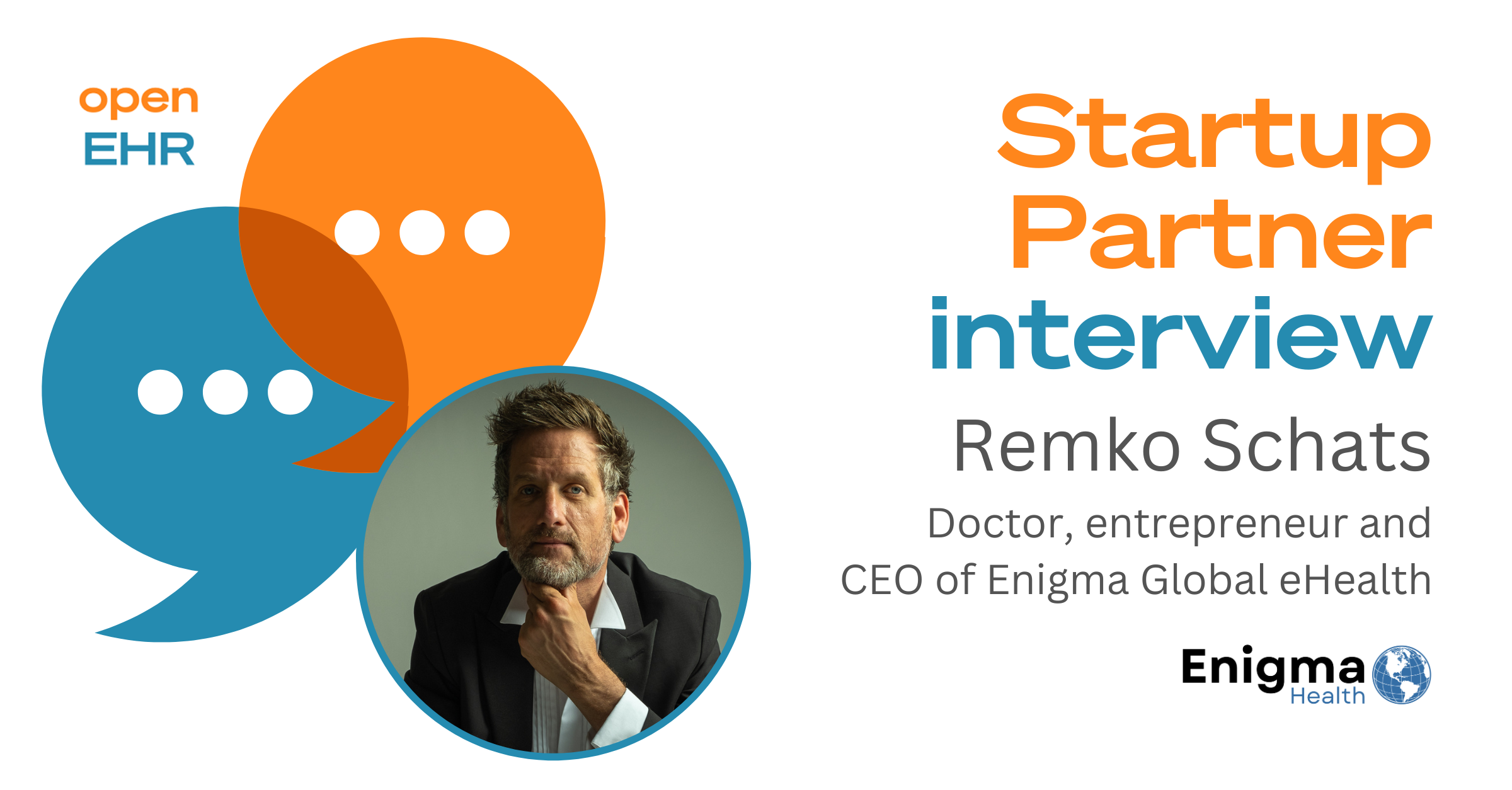Enigma Global eHealth recently joined openEHR as a Startup level industry partner. Led by Remko Schats, a respected global health doctor renowned for his malaria vaccine research and fieldwork in Africa and Asia, Enigma Global eHealth is building its secure eHealth platform in 2024. The platform will enable communication among patients, doctors and healthcare institutions, granting patients global access to their digital vaccine passport synced with their Electronic Health Records (EHR). We caught up with Remko last week for a quick update on his plans…
Remko, tell us a bit about yourself and what led you to the work you’re involved in today
After graduating as a medical doctor, I specialised in tropical medicine and global health for two and a half years, covering many disciplines. In the three years after, I worked at a rural hospital in Ghana and with doctors without borders (MSF), in a refugee camp of around 20.000 people, at the border of Chad and Sudan. Following that, I volunteered in Indonesia preventing malaria outbreaks, after the 2004 south-east Asia tsunami, which sparked my interest in malaria.
This interest led me to a PhD programme at Leiden University Medical Centre, where we conducted further vaccine trials with a deadly malaria variant. I received recognition for this work with the Elsevier clinical research award in the USA.

From there, as there’s not a lot of tropical medicine to practise in the Netherlands, I became a GP, but I felt there was still something missing in my career, and I continued my studies with an executive MBA at Erasmus University in Rotterdam which cultivated my long-standing desire to become an entrepreneur. Drawing on my MBA coursework, I detailed my entrepreneurial aspirations during several months, founded Enigma Global eHealth a few months post-graduation and was recently accepted at UtrechtInc, a global top 10 university-linked business and science incubator. And here we are…
Would you consider returning to Africa?
My fieldwork in Chad presented significant challenges: the temperatures are high and the infrastructure is scarce, with only a few tarmac roads. There wasn’t even a medical school in Chad: doctors came from neighbouring Cameroon. Plus, there were almost continuous threats of rebel activity at the border with Sudan. Due to the conditions, our mission was cut short from nine to six months. The workload was relentless, often seven days a week. Contracting malaria was less of a risk because it was less prevalent during the dry season in that region. However, with the onset of the rainy season, the malaria risk increased.
That’s the focus of my startup: engaging with travellers, businessmen and expatriates and their international yellow vaccine booklet. Eventually I do plan to extend Enigma’s Global eHealth platform to all people – and patients – around the globe, and also to refugees and people living in low and middle-income countries, especially in Africa. Everybody has the right to adequate healthcare. A proper, globally connective, digital EHR is one of the necessities to accomplish this.
You mentioned the international yellow vaccine booklet…?
Yes, I’ll be digitalising those in collaboration with the National Coordination Centre for Travel Advice (LCR) and the Ministry of Health, Welfare and Sport (VWS). We’re likely the first in Europe to do this; hoping other countries will follow suit. openEHR plays a pivotal role as this is the foundation for Enigma’s electronic health record platform and the yellow vaccine booklet, primarily handling vaccine data and serving as a portal. The integration of the yellow vaccine booklet into the Enigma Global Health platform will be seamless to prevent any data loss.
Tell us about the Enigma Global Health platform
It is set to become a global ehealth platform for doctors and patients, prioritising patient ownership and custody of their medical records. This aligns with the EU’s push for the European Health Data Space (EHDS). Collaborations with health institutions mark the beginning of our efforts.
We’re currently focusing on the international WHO yellow vaccine booklet as a starting point, and securing initial funding from the government before the end of the year. Further proposals aim for government funding before we launch. Simultaneously, private investor contributions will support the initiation and expansion of our global health initiative platform globally.
What additional features could be integrated into the platform?
Considering the patient’s ownership of the electronic health record, there are a wide variation of possibilities: connection with wearables or other medical devices and connections with AI technology or platforms, for instance, could provide preventative insights based on the patients’ health data. As a platform leader, I envisage collaborations with various organisations and companies to leverage patient data, to give patients greater benefits from their health journey through their own generated health data. I envisage we’ll start building in 2024.
Did you make it to the openEHR conference in Arnhem?
Yes, I attended. It was great. It was wonderful meeting people I’ve mostly only known online for so long, especially the team from Better. My openEHR journey started by joining the first national openEHR meeting in the beginning of 2023. I immediately saw the potential of openEHR for my company and felt a need to connect. I reached out to Tomaz Gornik, the CEO of Better, on LinkedIn and asked him how we could collaborate, in particular as a startup in my case. I spoke to Petar Abadzic, the head of international business development, who immediately understood my business case. The Better team has been extremely helpful and friendly. That’s true of the whole openEHR community: I feel very welcome.
I also met Jan de Lange – founder of the International/European Masterclass openEHR – a connector of health innovators and the supporter of openEHR Netherlands. I shared my one-pager on Enigma Global eHealth with him so he knows me and my startup very well. Currently, I am also connecting to other institutions like the Dutch competence centre Nictiz for digital health and the Dutch Global Health Hub, of which Enigma Global eHealth has been recently proposed to become an official partner. I’ve also become a member of the Barcelona Health Hub – it’s a great ecosystem for healthcare professionals and organisations.
I’m highly interested in diving into real data work, but currently my involvement at that level is limited due to work on the startup. I’m a doctor, not an IT expert, but I’m eager to learn more as I find it important that doctors are part of the design and implementation of innovative IT platforms as they, similar to patients, are the end-users and can have valuable input from their own work experiences.
Entrepreneurship really resonates with me – I thrive on its challenges, networking and the uncertainty of a startup. I work diligently, balancing my time between GP surgery, managing business meetings and the weekly lectures or coaching sessions part of the validation programme of UtrechtInc all during weekdays, with weekends being equally busy. It keeps me on top of things. I’m grateful for all the opportunities, full of energy and love the journey!
By adopting openEHR, Enigma Global eHealth will contribute significantly to expanding data accessibility in healthcare on a national and a global scale. If you’re a startup within the digital healthcare sector, why not join forces with us? Learn more about our membership packages here.
For more information about Remko and his work, visit www.remkoschats.com/about.


Leave a Reply